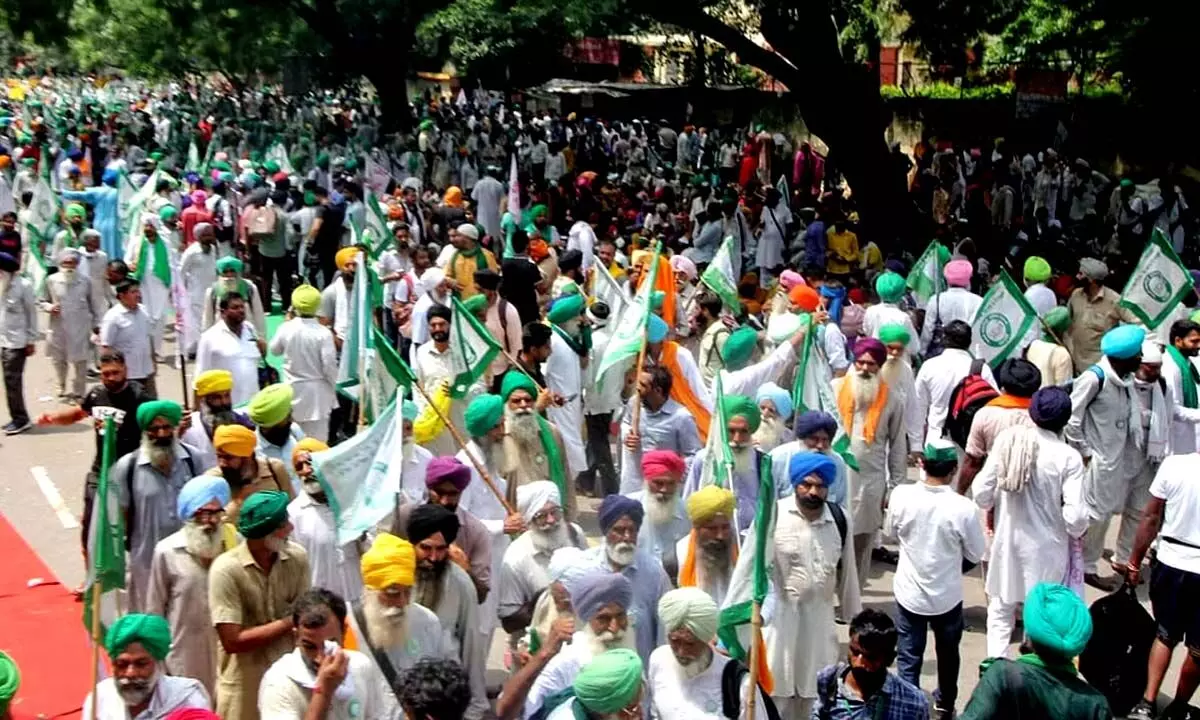BKS rally a warning signal for Govt
Farmers came to Delhi from several states - not just from the nearby Punjab, but also Maharashtra, Telangana, Andhra Pradesh, Rajasthan, Madhya Pradesh, and West Bengal
image for illustrative purpose

Their main demands were an exemption of GST on farming activities, higher income support provided under the PM-Kisan scheme, reversal of the permission for commercial production of genetically modified (GM) crops, and minimum support prices (MSPs) for their produce based on the input cost. The farmers said they will intensify the protest if the government does not meet their demands within three months
The RSS-affiliated Bharatiya Kisan Sangh (BKS) held a huge rally on Monday in the national capital demanding more sops for farmers and a rollback of GST on agricultural produce. In fact, the gathering was also against a few policies of the Narendra Modi government.
The effort put in by the organizers indicates their serious intent. Farmers came to Delhi from several states - not just from the nearby Punjab, but also Maharashtra, Telangana, Andhra Pradesh, Rajasthan, Madhya Pradesh, and West Bengal.
Their main demands were an exemption of GST on farming activities, higher income support provided under the PM-Kisan scheme, reversal of the permission for commercial production of genetically modified (GM) crops, and minimum support prices (MSPs) for their produce based on the input cost. The farmers said they will intensify the protest if the government does not meet their demands within three months.
One way of looking at the rally and the rhetoric is simple: the BKS, which was conspicuous by its absence in the 14-month-long stir against the three farm laws, is trying to justify its existence as a major body of agriculturists. Even before the stir that ended in November last year, the BKS had to prove itself as genuinely representative of farmers rather than a sister association of the ruling party. In fact, every organization representing a section of people - be it students, workers, or farmers - has to face such a situation whenever an associated party is in power.
In the case of the BKS, however, this is a lot different. Its criticism of the Modi government may not be a sham. Being a true RSS body, it continues to subscribe to the long-discredited socialist and statist doctrines which have long infested economic policy. Nothing else explains the BKS' demand for MSPs and resistance to GM crops.
MSPs have been a bane of Indian agriculture; any sensible agriculture economist knows this. They have dissuaded farmers from innovating and cultivating other crops. Only a handful of crops and states benefit from remunerative prices.
At any rate, such prices militate against the spirit of economic reforms, which have brought a great deal of prosperity in the country and which are sadly missing in the farm sector. The Modi government tried to introduce major reforms in the sector with three laws - the Farmers' Produce Trade and Commerce (Promotion and Facilitation) Act, 2020, the Farmers (Empowerment and Protection) Agreement of Price Assurance and the Farm Services Act, 2020, and the Essential Commodities (Amendment) Act, 2020.
They were excellent laws that would have helped not just agriculture but the entire economy. However, the manner in which these were brought in was deplorable, if not scandalous. For instance, they were cleared in the Lok Sabha in four minutes.
There was inexplicable haste in the introduction of the three laws, which affected an important sector employing half the country's workforce. Besides the haste, the timing was wrong: that was the time when the entire nation was distracted by Covid-19. And, of course, there were hardly any debates or discussions on such major issues.
As they say, haste makes waste. It was unfortunate that there was a big movement against good laws, leading to deaths of many protesters, huge disruptions in Delhi and adjoining areas, and a humiliating retreat by the government. Indeed it was a big setback to the cause of reforms in agriculture and, concomitantly, a boost to the farm bodies which are against any liberalization of the sector.
The BKS also favours the practice of freebies, one of which is the PM-Kisan scheme. Beginning in December 2018, it provides Rs 6,000 per year to farmer families. The BKS wants a hike in the benefits. Clearly, this is against the policy framework that Prime Minister Narendra Modi now wants to promote in the country. Time and again, he has spoken against the culture of freebies.
The BKS' opposition to GM crops is also unfortunate; it reveals the farmers' body's Luddite mindset and resistance to the use of science and technology in agriculture. In short, the BKS' warning that it "will roar and be vocal" if the government does not wake up in time should not be taken lightly. The government must take appropriate measures to ensure that the BKS' bite is not as dangerous as its bark.

